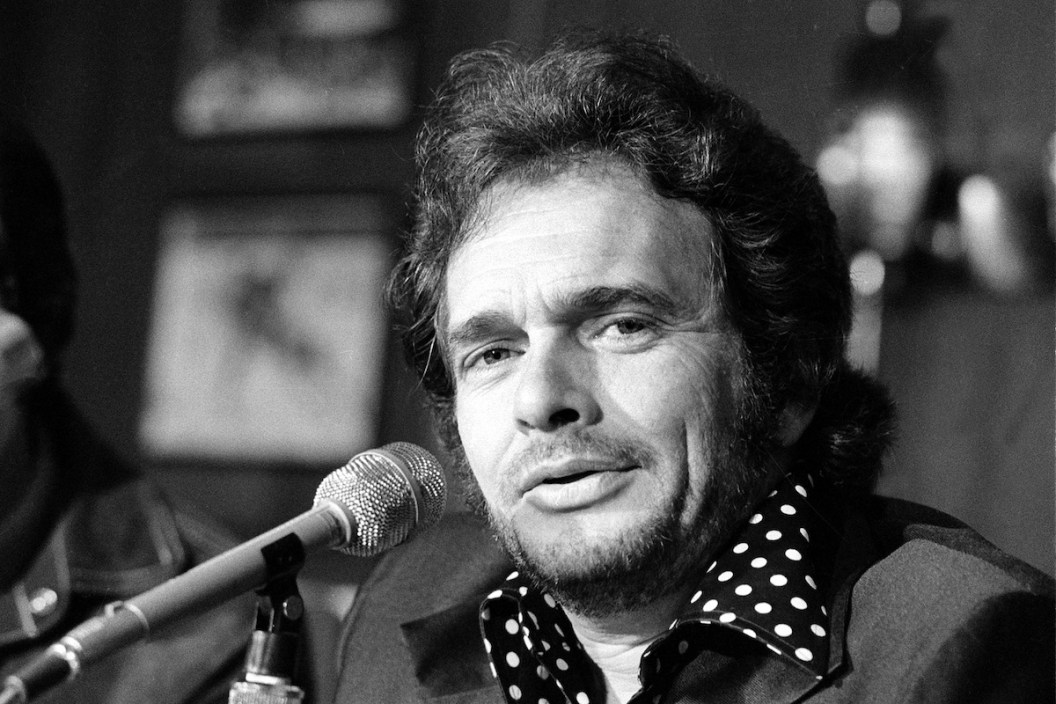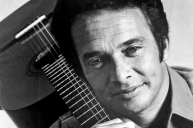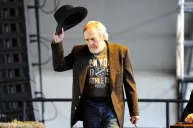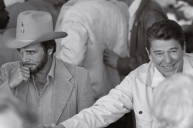It's been over 50 years since Merle Haggard's other take on small-town patriotism, "The Fightin' Side of Me," was released. His 1970 single and the prior year's "Okie From Muskogee" represent multiple things for Haggard's legacy, cementing his reputation as a storyteller while exemplifying Nashville's reaction to the Vietnam War (even if the latter perception came in spite of Haggard's creative intentions).
Videos by Wide Open Country
A Counter-Protest
By the dawn of the 1970s, the folk revival and rock-loving hippies made an always-changing popular music climate a source for anti-war sentiments shared by roots-leaning musicians. That's why Creedence Clearwater Revival songs blare whenever a movie or documentary makes it to the Vietnam years.
Country songs remained apolitical for the most part, making "Okie From Muskogee" or "The Fightin' Side of Me" groundbreaking. Both share an ornery view of war protesters and draft dodgers. Even if parts of both songs seem tongue-in-cheek and Haggard was simply playing a character, they offered an opposing voice to politicized rock and folk music.
A Calculated Move
In the wake of "Okie's" run as a country hit, Capitol Records and producer Ken Nelson sought a follow-up in the same vein from Haggard. Allegedly, Haggard wanted a song about an interracial couple titled "Irma Jackson" as his next single. That song didn't see the light of day for two more years due to its content. Instead, Haggard was hassled into cutting another chart-topping, patriotic song.
Read More: Waylon Jennings Covered Fleetwood Mac's Enchanting Classic 'Rhiannon'
A Gifted Storyteller
Haggard doesn't sing "The Fightin' Side of Me" as himself. Like other great country singers, he often voiced songs' narrators instead of speaking his mind. These instances of country singer theatrics allow listeners to suspend disbelief for something that's entertainment even when the lyrics get a little heavy. In this case, Haggard is basically the uncouth know-it-all at the bar or barbershop, ready to explain why his kids' teachers and the local newspaper are always wrong.
Haggard's lyrical performance is presented here as just part of his act because, frankly, it's hard to get a read on his political views. If anything, such latter-day songs as the anti-flag burning "Me and Crippled Soldiers" and his genuine take on "The Immigrant" paint him as a non-partisan thinker who loved freedom, even if he didn't really want to argue with strangers over it.
This character Haggard becomes loves America above all else. Supporting our troops is honorable, but his good-spirited patriotism boils into an unbridled rage. In fact, defending the freedoms he upholds defines the narrator's very manhood. Notice that he defends freedoms "our fightin' men have fought and died to keep" while dismissing the opposition as some "squirrely guy" who doesn't have to live here if it's so awful. Basically, only wimps oppose the "wars we fight," which could open a whole different discussion about how past country music hits view gender roles.
A Career-Defining Hit
"The Fightin' Side of Me" proved to be a successful follow-up single to "Okie From Muskogee." Both took a turn topping the Billboard Hot Country Singles chart. Together, they expanded Haggard's public image. Beforehand, "I"m a Lonesome Fugitive" and "Mama Tried" created a proto-outlaw image of sorts for the singer. Within the next two years, he'd become an unlikely and successful part of the music industry's running commentary on war, making him a forerunner for the boldly patriotic Charlie Daniels Band. Nowadays it's another artistically-rewarding step between Haggard helping Buck Owens craft the Bakersfield sound and earning his deserved status as the legend behind some of country music's biggest hits.
"The Fightin' Side of Me" Lyrics
I hear people talkin' bad,
About the way they have to live here in this country
Harpin' on the wars we fight
And gripin' 'bout the way things oughta be
And I don't mind 'em switchin' sides
And standin' up for things they believe in
But when they're runnin' down our country, man
They're walkin' on the fightin' side of me
They're walkin' on the fightin' side of me
Runnin' down a way of life
Our fightin' men have fought and died to keep
If you don't love it, leave it
Let this song that I'm singin' be a warnin'
When you're runnin' down our country, hoss
You're walkin' on the fightin' side of me
I read about some squirrelly guy
Who claims that he just don't believe in fightin'
And I wonder just how long
The rest of us can count on bein' free
They love our milk and honey
But they preach about some other way of livin'
But when they're runnin' down our country, man
They're walkin' on the fightin' side of me
They're walkin' on the fightin' side of me
Runnin' down the way of life
Our fightin' men have fought and died to keep
If you don't love it, leave it
Let this song that I'm singin' be a warnin'
When you're runnin' down our country, man
You're walkin' on the fightin' side of me
You're walkin' on the fightin' side of me
Runnin' down the way of life
Our fightin' men have fought and died to keep
If you don't love it, leave it
Let this song that I'm singin' be a warnin'
When you're runnin' down our country, hoss
You're walkin' on the fightin' side of me
This story previously ran on July 17, 2020.
Now Watch: The Western Starring Highwaymen Willie Nelson, Waylon Jennings, Johnny Cash and Kris Kristofferson
https://rumble.com/embed/u7gve.v3v63d/



